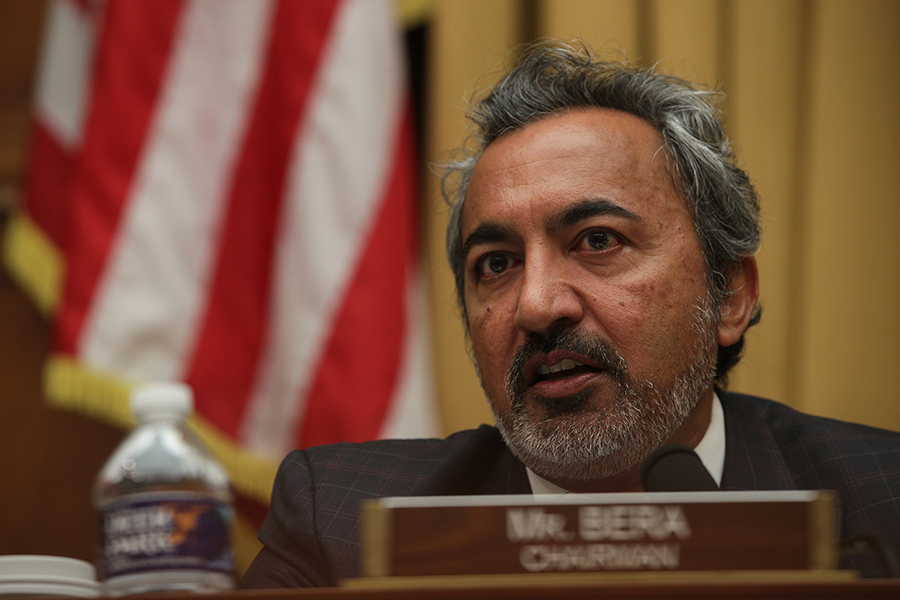“For half a century, ACA has been providing the world … with advocacy, analysis, and awareness on some of the most critical topics of international peace and security, including on how to achieve our common, shared goal of a world free of nuclear weapons.”
Move Signaled for Firearm Exports Changes
December 2019
By Jeff Abramson
The Trump administration formally notified Congress last month that it would move ahead with controversial changes to regulations on how certain firearms are exported, starting a 30-day clock before final rules could be published. The move pushes past a hold that Sen. Bob Menendez (D-N.J.) had put on the changes in February and sidesteps efforts in the House-passed National Defense Authorization Act (NDAA) that would prevent them.
 Under the proposed rules, semiautomatic and nonautomatic firearms and their ammunition, as well as certain other weapons, would be removed from the first three categories of the U.S. Munitions List (USML), a State Department-administered list of weapons. Sales of weapons from that list that meet certain dollar-value thresholds are notified to Congress, and a complex set of rules governs the reasons for which they may be transferred to and used by foreign recipients. Under the proposed changes, exports of these weapons would be transferred to a list administered by the Commerce Department, known as the Commerce Control List (CCL). The CCL does not trigger congressional notification requirements and allows for more streamlined arms transfer approvals.
Under the proposed rules, semiautomatic and nonautomatic firearms and their ammunition, as well as certain other weapons, would be removed from the first three categories of the U.S. Munitions List (USML), a State Department-administered list of weapons. Sales of weapons from that list that meet certain dollar-value thresholds are notified to Congress, and a complex set of rules governs the reasons for which they may be transferred to and used by foreign recipients. Under the proposed changes, exports of these weapons would be transferred to a list administered by the Commerce Department, known as the Commerce Control List (CCL). The CCL does not trigger congressional notification requirements and allows for more streamlined arms transfer approvals.
In a Nov. 12 press release critical of the changes, Rep. Ami Bera (D-Calif.) said the rules "will remove critical oversight mechanisms that will increase the probability that U.S. firearms will be misused to create violence and instability around the world." In March, Bera led a hearing on the changes as chair of the House Foreign Affairs oversight subcommittee. Menendez also cited the lack of congressional oversight as one of two primary concerns in his February hold on the changes.
But the administration attempted to address concerns about 3D gun printing technology transfers by adding new rules to the CCL that would require a license for online distribution of 3D printing plans. Currently, such plans are regulated under the USML and deemed an exportable item. The administration’s original proposal did not address the 3D printing issue, which was a second reason for concern highlighted in Menendez's hold and in legislative proposals to address the issue that he and others led. (See ACT, March 2019.)
An amendment passed in July to the House version of the NDAA, patterned after stand-alone legislation introduced by Rep. Norma Torres (D-Calif), would prohibit changes to the relevant USML categories. The NDAA conference committee has not reconciled the House bill with the Senate version, which did not include the Torres amendment. Menendez has not indicated if he would attempt to place a hold on the changes again.
Export rule changes have not been as high profile as some other domestic efforts related to assault-style weapons, but Democratic presidential candidates Joe Biden and Sen. Elizabeth Warren (D-Mass.) have explicitly called for export authority to remain with the State Department. Robin Lloyd, managing director at the Giffords campaign to prevent gun violence, said on Nov. 13, "This White House clearly is more concerned with appeasing the gun lobby than making it harder for exported firearms to contribute to international violence and crime.”
